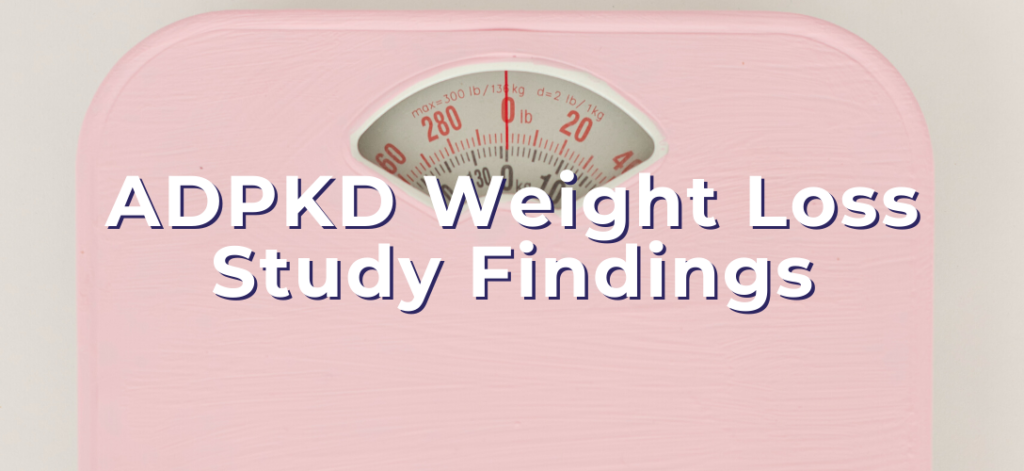
Published on January 25, 2022 | Can weight loss play a part in slowing autosomal dominant polycystic kidney disease progression? The University of Colorado, Denver recently released findings from a research study focused on weight loss and cystic disease progression in ADPKD. Funded in part by a 2020 PKDF Investigator Grant to Kristen Nowak, Ph.D., this ADPKD weight loss study had interesting results.
ADPKD Weight Loss Study and Animal Models
There’s a growing body of evidence that supports metabolic dysregulation (e.g. abnormal sugar use and storage or abnormal fat metabolism to generate energy within cells) helps drive ADPKD progression. Data from animal studies suggest that a variety of dietary interventions, ranging from reducing total calories eaten per day, to limiting eating to only certain times of day, to periodic fasting can slow disease progression in animal models of ADPKD. These dietary interventions point to several potential mechanisms by which dietary intervention slows ADPKD progression in animals—weight loss, caloric restriction, and/or periods of fasting—dependent or independent of metabolic reprogramming
Scientists sought to understand the feasibility of two dietary interventions (daily caloric restriction [DCR] and intermittent fasting [IMF]) in overweight or obese adults with ADPKD and to obtain exploratory insights as to whether either dietary approach led to changes in kidney growth. To assist their research, they utilized the ADPKD Registry to support recruitment for the clinical trial.
In order to complement the clinical study in people with ADPKD, they directly compared the impact of DCR, IMF, and time-restricted fasting (TRF) in an orthologous mouse model of ADPKD. To explain, orthologous means the disease in the mouse model is caused by mutation of the same gene that causes ADPKD in humans. Why is the orthologous mouse model important? It allowed direct comparison of all three diets and the study of the effect of diet in normal body weight animals.
With this study, comes a number of research firsts. This is the first study of intermittent fasting in a PKD animal model and the first study of time-restricted fasting in an ADPKD animal model. Furthermore, this is the first clinical trial of behavioral weight loss in people with ADPKD.
ADPKD Weight Loss Study Key Findings
The major takeaway from this work is that both dietary interventions are feasible and result in clinically significant weight loss. Additionally, slowed kidney growth correlated with a reduction in body weight and a reduction in abdominal fat. This finding is important because it’s the first interventional clinical study to demonstrate the feasibility of dietary interventions in ADPKD. Also, it suggests the potential for slowing ADPKD progression by weight loss in overweight or obese patients.
This was designed as a one-year study. Overweight or obese patients with ADPKD, and normal to moderately declined kidney function, were assigned to a DCR or IMF dietary intervention. Throughout the year, they assessed the safety, acceptability, and tolerability of the diet by a combination of questionnaires and clinical measures. They assessed weight loss, loss of various types of body fat, and changes in kidney growth by MRI as well.
Human Clinical Trial Highlights
As a result, the study concluded both DCR and IMF are feasible interventions. Each led to clinically significant weight loss and loss of fat volume. There was a correlation between the amount of weight loss and reduction in kidney growth and amount of abdominal fat/ total fat loss and kidney growth in overweight or obese patients with ADPKD. In addition, they found:
-
- DCR was better tolerated than IMF
- DCR led to a greater loss of weight than IMF, possibly due to diet tolerability and better adherence to the DCR rather than the IMF diet
- Annual change in kidney growth (assessed by height-adjusted total kidney volume) was low in comparison to historical data from other clinical studies
- Annual change in kidney growth was highly correlated to percent change in weight and change in BMI at one year. The greater the percentage of weight loss or reduction in BMI, the slower the change in kidney size.
These findings are consistent with the research team’s prior epidemiologic studies that showed an association between weight and obesity and ADPKD progression.
In the animal studies, only DCR resulted in weight loss as compared to control animals that were not on a dietary intervention. And only DCR resulted in reduction in ADPKD progression in this mouse model of ADPKD.
Animal Model Highlights
-
- Impact of DCR in this animal model of ADPKD is consistent with prior studies
- Long term DCR diet in normal body weight animals resulted in health risks, likely due to a decrease in lean body mass
- Animal data is consistent and supportive of the conclusions from the clinical study
Limitations and Caveats of this Research
It’s vital to note that this was a small clinical study that didn’t contain a control group to directly assess the impact of the dietary interventions relative to each other. Furthermore, the data suggesting weight loss and loss of abdominal and total fat correlates with a reduction in annual kidney growth are hypothesis-generating. It will need to be confirmed in a larger study that includes a control group for direct comparison. By expanding the study, they can test how these findings relate to weight or fat loss in ADPKD patients with a normal body weight.
The accompanying mouse model suggests long term DCR in normal weight ADPKD mice could present safety issues. The study also presents a question. Are the effect of the dietary interventions in people or animal models only due to weight loss? Or are they due to changes in the metabolic patterns at the cellular level?
This year, the UC Denver investigators will begin a Phase 2 study. In this phase, they’ll be comparing DCR to a control group in overweight or obese patients with ADPKD. The trial will assess change in kidney growth as the key endpoint of the study.
The PKD Foundation’s Role
At the PKD Foundation, we’re funding research to advance our understanding of ADPKD progression. Importantly, this includes funding both animal and human studies to learn how nutrition and metabolism impact ADPKD progression. These grantees include:
2021 Grant Recipient, Katharina Hopp, UC Denver
2020 Grant Recipient, Eduardo Chini, Mayo Clinic

2020 Grant Recipient, Roman-Ulrich Muller, University of Cologne
2020 Grant Recipient, Kristen Nowak, UC Denver
We’re funding basic science to understand the mechanism by which dietary or nutritional interventions slow disease progression. This will assist in the evaluation of the results from future clinical studies. These funded projects include:
2021 Grant Recipient, Ronak Lakhia, UT Southwestern
2021 Grant Recipient, Jelena Klawitter, Ph.D., University of Colorado Anschutz Medical Campus
Beyond informing how diet can slow progression, this research may reveal new mechanisms in how ADPKD progresses. Hopefully, it’ll present new approaches in treating ADPKD.
Interested in ADPKD and ARPKD research in people? Through our Act Alert program, you can sign up for notifications about ongoing research studies and clinical trials. Choose to receive ADPKD-related alerts or ARPKD alerts. Interested in both? Sign up for both!














I have just been diagnosed with PKD, I would love updates.
I am on PD diaylis from PKD and have been working out with a trainer since Oct 2021. While I am getting healthier I have not be able to lose harder any weight in abd area. But have toned up other parts. In info would be great. Caus3 I don’t each much.
So happy yo see this! I have been practicing IMF for 10 years; my kidney function was dropping at that time it increased some and has remained unchanged since. IMF has become a way of life for me and I feel so much healthier and labs are good!
I would like information on ADPDK treatment. I have PKD and PLD .
Hi Mary, check out this resource: https://pkdcure.org/living-with-pkd/
Hi Maria,
I have PKD and recently started IMF. Great to hear your fiction has remained stable. Can you please share details of your IMF practice. For example, do you do 16:8?
Best,
Shannon
I am diagnosed with PKD.
I too have PKD, with what looks like a pregnant belly…. I am 57! Thank you